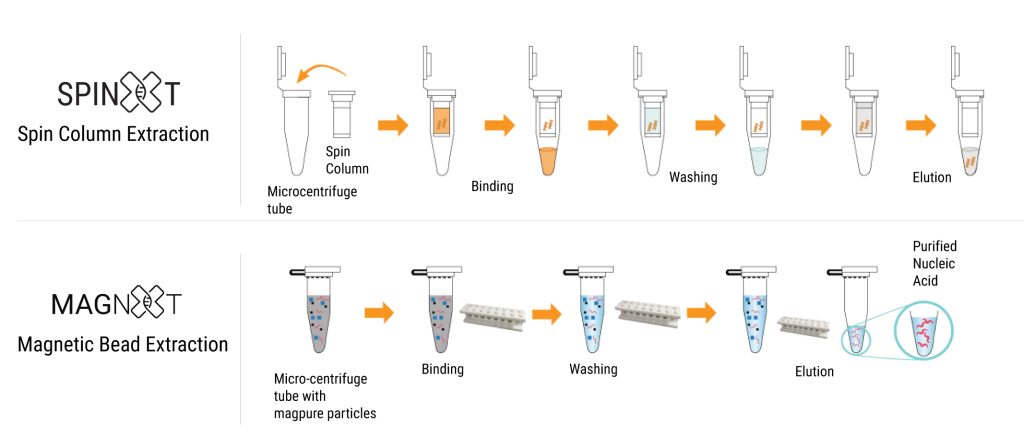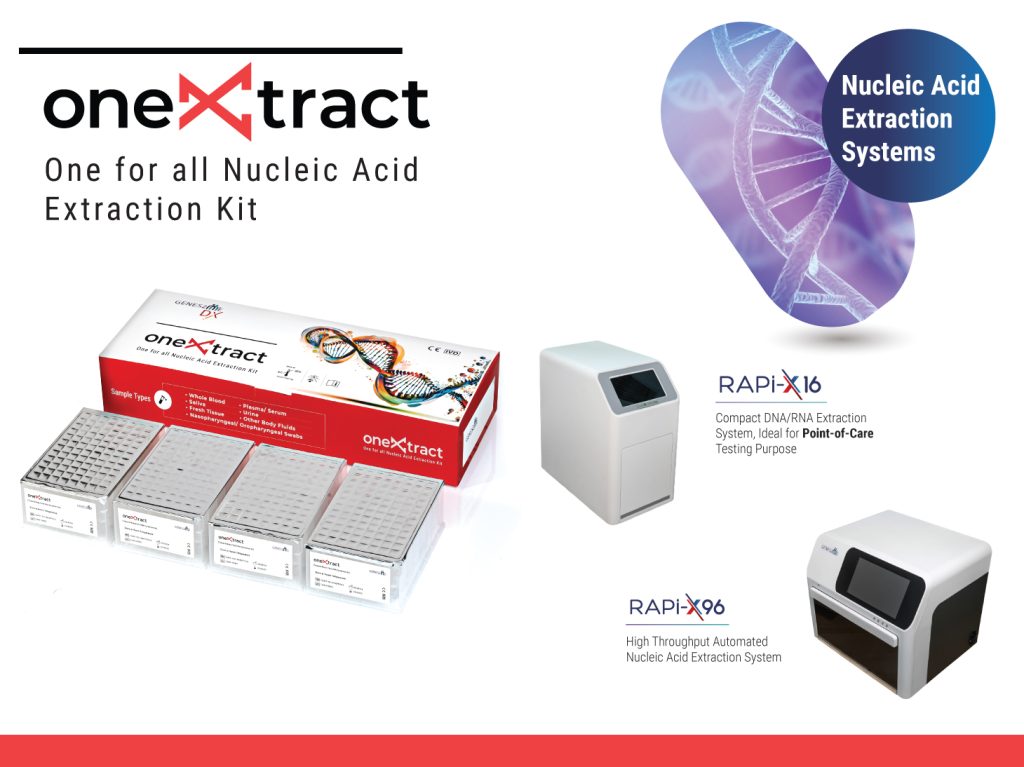Efficient Nucleic Acid Extraction is Indispensable for Accurate Molecular Diagnostics
Nucleic acid extraction, including DNA, RNA and total nucleic acids is the first and the most crucial step in any molecular biology based experiment.
Extraction and purification of high-quality nucleic acids serves as the starting point for several downstream applications like Polymerase chain reaction (PCR), Sanger Sequencing, Next generation Sequencing (NGS) etc.
The extraction protocols for all the kits follow a common workflow starting with cell lysis, followed by isolation and purification of the nucleic acids from the samples. Majority of the commercial kits available currently for nucleic acid extraction are based on either of the two extraction methods, namely spin-column or magnetic bead chemistry.
Cell lysis:
This step usually uses a non-ionic detergent to disrupt the cell membrane, denature the proteins and release the nucleic acids. It is a crucial step to ensure sufficient quantity of good quality nucleic acids to be released from the cells with minimal shearing.
Nucleic acid extraction and purification:

Isolation of nucleic acids from the lysed cells relies on efficiently removing proteins, and other low molecular-weight components from the sample. This can be achieved by either a column-based approach or binding of nucleic acids to magnetic beads.
1. Spin-column based
One of the solid-phase extraction methods which uses spin columns coated with silica membranes that selectively bind to nucleic acids under a centrifugal force efficiently removing impurities and proteins from the samples. The silica membrane is positively charged allowing strong binding with the negatively charged DNA molecules and allowing pure DNA to be extracted from the samples.
2. Magnetic bead-based
A modification of the solid-phase extraction method which uses magnetic beads in the form of paramagnetic particles that bind specifically to nucleic acids and allow efficient removal of proteins and other impurities from the sample. This method eliminates the centrifugation steps, exposure to organic solvents, washing and elution steps from the columns, making it an easier and more convenient alternative.
Genes2Me offers a range of manual nucleic acid extraction kits using both spin-column approach (SpiNXT kits) or magnetic bead based method (MagNXT kits). The kits available in automated formats are based on the magnetic bead method.
OneXtract: One-for-all Nucleic Acid Extraction Kit

Genes2Me’s OneXtract is a total nucleic acid extraction solution suitable for both DNA and RNA extraction and purification with high-throughput allowing 8, 16 or 96 samples to be processed simultaneously. The kit is based on magnetic bead binding technology and is available in both manual and automated formats, allowing maximum flexibility to the end user. It is compatible with multiple sample types capable of yielding high-quality DNA and RNA without the need of any additional reagents.
Automated nucleic acid extraction
Automated benchtop systems for nucleic acid extraction have transformed the molecular diagnostic space by reducing the time and labour while increasing the accuracy and efficiency of disease diagnosis. Automation has significantly increased the number of samples that can be processed parallelly thus allowing faster turn-around-time (TAT)- a major pillar of success for any diagnostic setting.
Genes2Me’s undying hunger to innovate competitive and automated molecular diagnostic solutions resulted in two fully-automated extraction platforms, well suited for diagnostic laboratories as well as for Point-of-Care detection- Rapi-X16 and Rapi-X96.
Both the platforms are based on the magnetic bead chemistry and use 96 well plate format (pre-filled cartridges) for parallel extraction of up to 16 samples (for Rapi-X16) and up to 96 samples (for Rapi-X96). They are highly accurate, fast (<30 minutes run-time), compact and portable devices yielding high-quality purified DNA/RNA from varied sample sources.
Conclusion
Nucleic acids carry genetic information that defines the normal functioning of organisms and also conveys important information regarding disease predisposition and detection. Therefore, the availability of an efficient, precise and robust extraction solution is a mandatory pre-requisite for any molecular biology based diagnosis or research.
Automation ensures minimal human error and high-throughput saving time as well as resources easing access to affordable and accurate diagnosis. Fully automated extraction platforms and a comprehensive range of compatible extraction kits for a plethora of sample types, allows Genes2Me to be among the pioneers for manufacturing cost-effective molecular diagnostic and point-of-care solutions.
